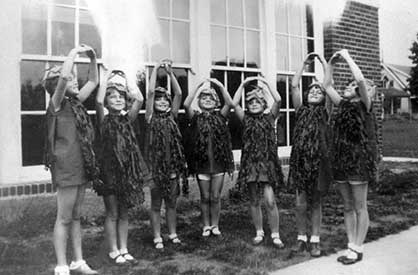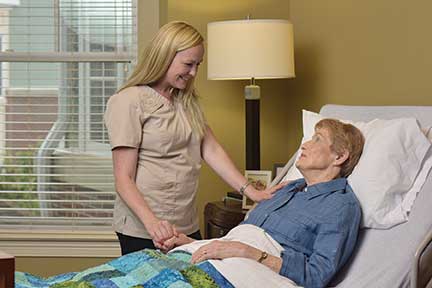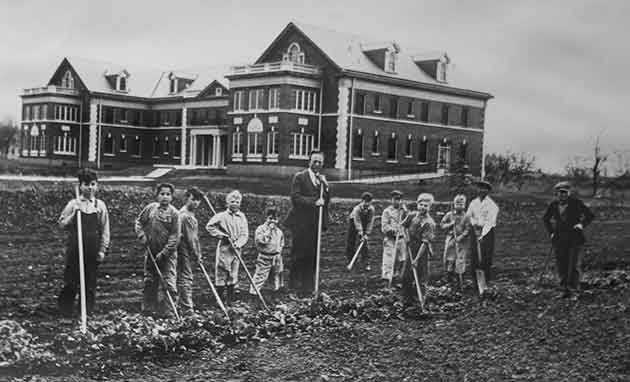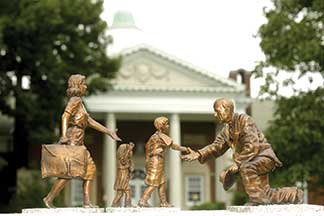For many, going home means stopping in for a visit, seeing family and friends, and reconnecting with the places where early memories were made. Time seems to stand still there, and throughout the years, family can be a source of support to return to when dealing with life’s most difficult challenges. Such is the setting of Masonic Homes of Kentucky, which turns 150 this year. Many residents, once small children living and learning here, come back again later in life to receive support and care during challenging times. The campus has a special history of being a home to many, and providing support to those in need.
Caring for More than a Century
Heeding President Abraham Lincoln’s call to the people to uplift the families that lost their husbands and fathers in the Civil War, Masonic Homes of Kentucky started to break ground in 1867 and take in orphans and widows.

“That was a time when, if a woman was widowed, there really weren’t many options available to provide for her family,” says Nicole Candler, spokeswoman for Masonic Homes of Kentucky. “She might have been able to get a job as a housekeeper or maid or as a nanny, and then her children would come to the orphanage. She would visit her children and have relationships but overall it just wasn’t a time when she could take care of them on her own.”
Masonic Homes later served families affected by World War I, coal mining accidents, the flu epidemic in the 1920s, and other hardships. By the late 1980s, the advent of Social Security programs allowed children to be cared for in place. “The need to care for children ramped down, and at the same time there was the growing population of seniors that needed care,” says Candler.
With the last orphan leaving the campus in 1989, the company decided it was time to make a change. It constructed a personal care center with 104 accommodations and began to assess new ways to use other buildings on its Louisville and Shelbyville campuses. “We looked at the buildings of our campuses and thought we could repurpose these into apartments that would be able to serve seniors,” says Candler. “That was the turning point for us.”
A 21st Century Care Provider
Fully evolved for the 21st century, Masonic Homes of Kentucky now offers memory care, short- and long-term rehabilitation, personal care, skilled nursing care, dialysis, active lifestyle communities, and in-home care. Campuses are located in Shelbyville, Louisville, and northern Kentucky. Keeping its promise to care for children, Masonic Homes of Kentucky opened a day care center and preschool in 2011 on the Louisville campus. It’s the only program in the region serving medically fragile children, and it’s a place for residents to interact with children on a daily basis.
A Positive Environment
Sherry Sparrow is a certified nurse assistant (CNA) who has worked at Masonic Homes of Kentucky for the past eight years. When asked why she’s stayed, she says that, since day one, the center has had a positive atmosphere, which has been an ideal setting to build great relationships. “When I started, it seemed that everyone here really loved their jobs,” says Sparrow. “A lot of people that I’ve been working with have been here for 20 years or more, and it’s like being with my family. That’s why I stay here, it’s really like being at home.”

Sparrow currently works in the Sam Swope Care Center, on the Louisville campus. It’s here and in the Shelbyville location where Masonic Homes has made most renovations and where historic buildings still play an important role.
The Louisville campus included a school building where orphans attended classes and a print shop where they learned trades like printmaking and woodworking. The Olmsted dining hall, once serving meals to children and widows, is now a large event venue, popular with area weddings and other celebrations. And all the other houses that circle the campus were the dormitories where both the orphans and widows lived. Today, they are renovated as independent living units for seniors.
Coming Full Circle
Dolores Noller has been a resident of Masonic Homes for the past 14 years. She first lived there as an eight-year-old after her father died and her mother was left alone to care for six children. What stands out in her mind, she says, is the positive feeling that she had as a child while she was living and attending school there.
“I liked it from the very beginning,” says Noller. “I felt right at home. I was with peers, and we were all on the same level. That opened me up, and I really enjoyed my time here.”
Dolores went on to graduate and eventually left Masonic Homes. When she came back in 2000, she was 70 years old, married, and had lived in Alabama. She brought her husband, and the couple moved in to one of the senior apartments. “It was just like when I was eight years old,” she says. “I felt like I was home again.”

For Dolores, coming back to Masonic Homes meant coming home to a place of unwavering support. When her husband was diagnosed with vascular dementia in 2006, she cared for him until he passed in 2014.
“This was the perfect place to be because I had help available and I was very supported,” says Noller. “I was so glad. If we had stayed in Alabama, we had no family there, and it would have not been the same.”
As her husband’s condition worsened, Dolores moved him into the Swope Care Center for 24-hour care. “I could be with him every day and then get a good night’s sleep. I didn’t have to worry. He received excellent care. It just all fell in place for me here.”
Celebrating All Year Long
Masonic Homes continues to celebrate stories like Noller’s and several others during its 150 year anniversary celebration this year. Events range from a black tie gala to the Masonic Communities and Services Conference, which Masonic Homes of Kentucky is hosting, to an alumni reunion. A documentary about Masonic Homes’ legacy of care currently runs on the local PBS television station.

Candler says that the occasion is a great time to celebrate the profession as a whole. “This is a good industry to be in,” she says. “There is a market for our services, and it continues to grow. It’s a good opportunity to take some new approaches to marketing. It’s made a tremendous difference for us as a local, home-grown organization.”
For residents like Noller, connecting with others is the highlight. She is looking forward to the reunion with fellow orphans, and says she enjoys the opportunity to get together on Sundays with a free breakfast.
“Everyone is welcome,” says Noller. “So there’s no excuse for being lonely. If you’re lonely, all you have to do is get up and go to an activity.”